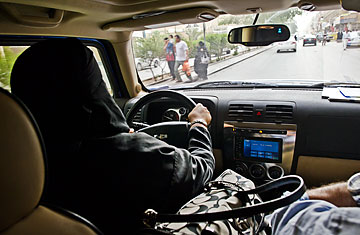
A Saudi woman in Riyadh during a protest that took place on June 17
When Maha al-Qatani settles into the driver's seat of her family's baby blue humvee these days, she goes through a familiar routine: a glance in the rearview mirror to ensure that her headscarf and face veil are on right; a whispered prayer; and a reassuring pat of her Coach handbag, stuffed with all the essentials for a possible prison stay — toothbrush, deodorant, comfortable clothes and prayer rug.
She may need them. On June 17, al-Qatani made history by becoming the first woman in Saudi Arabia to receive a traffic ticket. She sees it as a badge of honor, proving that she defied a prohibition on women driving in the kingdom and, she hopes, paving the way for more women to do the same. Still, the possibility of prison remains. "If no one sacrifices, no one will get their rights," al-Qatani said on the day of her maiden drive in Saudi Arabia.
In one of the most peculiar revolts to have been inspired by the Arab uprisings, al-Qatani and dozens of other women have taken to the streets — not on foot but behind the wheel. They are leaving their drivers at home and heading out on their own to the grocery store or to the doctor or to pick up their kids from school. Those thankless errands may plague women around the world, but for some in Saudi Arabia they are a long-dreamed-of freedom. "What these women are doing is brave, and what they are seeking is right," said U.S. Secretary of State Hillary Clinton of the protests.
Saudi Arabia — with its vast, unpopulated deserts, low-slung architecture and cheap oil — is a country made for cars. The capital city, Riyadh, is bigger than Los Angeles and has no public-transportation system. So women rely on male family members to get around or hire immigrant drivers at considerable cost.
Reforms in the 1960s opened the way for female education; now women make up 58% of the university population. But that achievement is not matched in the workplace, where women account for less than 15% of the labor force, mostly in the education and medical sectors. The government is urging private businesses to hire more women — under conditions designed to prevent mixing between unrelated men and women — but it is hard to see how that will happen if they can't drive to work. Many middle-class families see little incentive to let their daughters and wives work if they end up spending their salaries on drivers. Architect Nadia Bakhurji estimates that she spends an extra 25% in overhead just providing cars and drivers for the female staff at her firm. It's a sacrifice she is willing to make, she says, but in most other businesses, "it becomes a barrier to hiring women."
Despite repeated promises of change — most famously in 2005, when King Abdullah told Barbara Walters on ABC TV, "I believe the day will come when women drive" — Saudi Arabia remains the only country in the world where women are officially barred from getting behind the wheel. Why? "There is nothing in the Koran that prohibits a woman from driving," admits Sheik Abdallah al-Oweardi, a self-described moderate religious scholar. At least two of the Prophet Muhammad's wives are known to have ridden camels. But in religious rulings, conservative clerics have argued that driving allows women too much freedom and might lead to illicit mixing of the sexes. Says al-Oweardi: "This is to protect our women from harassment and to protect society from the problems you see in the West — single mothers and illegitimate children — that come from unconditional relations between men and women." When I asked him what a conservative scholar might say, he laughed and said none would ever meet with a female U.S. journalist.
The law is enforced. When Manal al-Sharif, a divorced mother of two, posted on YouTube a video of herself driving in May, she was detained for nine days. That dampened support for the movement, and since June 17, the campaign's official launch date, only a few dozen Saudi women have driven, even as thousands of supporters worldwide have posted videos of themselves honking their horns in solidarity.
